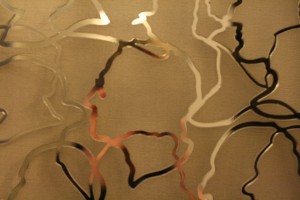 Do you remember that game you played as a kid? It went like this: you were having fun with a friend and all of a sudden they did something that really annoyed you. As your irritation grew, you got a brilliant idea and leapt into action. You started to shuffle away from them, watching them get smaller and smaller as you tilted your head and lined up thumb and index finger to make a frame. This gave you just enough space to squint and see your friend’s head sandwiched in between, disconnected from neck and shoulders and waist and legs. You would then proceed to push thumb and index finger together until you could no longer see them shouting, obnoxiously, “I just squished your head!” Then your friend did the same to you, and you both laughed, annoyance long forgotten and obtuse to the idea that this was weird and pointless and kind of grotesque. Because it didn’t feel pointless at the time; it felt strangely powerful. At least, to me it did.
Do you remember that game you played as a kid? It went like this: you were having fun with a friend and all of a sudden they did something that really annoyed you. As your irritation grew, you got a brilliant idea and leapt into action. You started to shuffle away from them, watching them get smaller and smaller as you tilted your head and lined up thumb and index finger to make a frame. This gave you just enough space to squint and see your friend’s head sandwiched in between, disconnected from neck and shoulders and waist and legs. You would then proceed to push thumb and index finger together until you could no longer see them shouting, obnoxiously, “I just squished your head!” Then your friend did the same to you, and you both laughed, annoyance long forgotten and obtuse to the idea that this was weird and pointless and kind of grotesque. Because it didn’t feel pointless at the time; it felt strangely powerful. At least, to me it did.
At age twelve we, kids, had matured beyond those childish games…or so I thought. I remember walking past a group of kids teasing one of their friends. The way they were positioned reminded me of that 6-year-old standoff. They shuffled away from their friend, heads tilted while squinting a bit, as if she suddenly appeared unfamiliar from the safe and expanding distance, and then they began to tease. From my vantage point, nearer the group who was making fun, the target of their bullying looked small and, maybe to them, less significant. I knew then that the distance meant something, but I didn’t know what.
Fast forward to my intern days. I remember a younger, greener version of me perched on the edge of my counselor’s chair across from teens, and young adults, and mid-lifers. I remember those moments when their relationships got squished, and they were emotionally constricted, draped across my couch, flattened by the loss. I began to notice a pattern in their stories. They would talk at great length about the change that happened in their significant other around the time he or she ended things. They would say: “He used to be so loving but now he seems so cold.” Or, “She’s not the same person, something changed in her, something shut down.” Or, “He’s so different than he was, even a few weeks ago. I don’t understand what happened.” The more I heard those stories, the more I came to understand what I couldn’t at age twelve. What they were responding to was the distance.
Those people who squished their significant others between thumb and index finger were playing at a game we all play at in our darkest moments. Yes, every single one of us plays this game–from those who are committing horrific acts of violence in the Middle East, to the boss mistreating his employees, to the 12-year-olds bullying their friend. In order to treat another human with cruelty, we have to squish their humanity. In order to squish their humanity, we have to create emotional distance. We have to withhold our affections, both from them and from ourselves.
When we’re cruel to others, it’s because we’ve emotionally shuffled away from them and squinted, until they’re nothing more than disembodied heads, until their beings seem disconnected, small and insignificant at our distal range. They no longer have flesh and bones and feelings and thoughts, they are inextricably dehumanized. Once we’ve distanced ourselves from them, we can treat those disembodied heads with all the indifference of an object, an object we might carelessly crush between finger tips. And once we’ve done that, we have experienced a seductive and twisted form of power.
This distance shows up at home and at work; in the war zone and the hospital; at the coffee shop and on the train. This distance begins inside of us. This ability to “squish” others comes from within.
When I mourn cruelty in the world, like violence in the Middle East, human trafficking in Baltimore, or oppression in North Korea, I have to simultaneously mourn the propensity for cruelty in that squinting, little blonde. I have to remember my own capacity to hurt and dehumanize and my own ability to oppress.
I then have to remember something else. There is beauty and light in the world as well. On our own we’re not capable of such beauty and light. But we can be transformed into those who love and transformed into those who respect. We can become guardians who protect and honor flesh and bones humanity.
When that happens, instead of shuffling away from others with squinted eyes, we’ll run towards them with open arms. Instead of constricting another’s humanity, we’ll eagerly become those who expand it, and that expansion will fill the cavities of our own hearts as well.
